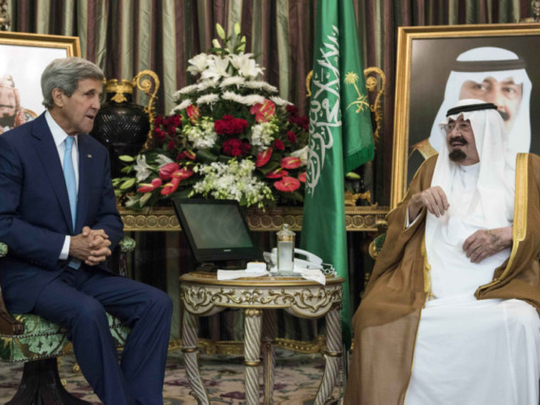
Riyadh: Saudi and US leaders have been speaking in harmony about the threat posed by the Islamic State of Iraq and the Levant, after a period in which the allies of 70 years frequently sounded discordant notes.
Isil’s rampage through northern Iraq and eastern Syria has persuaded the US to launch air strikes and seek Arab support for a broader campaign. Saudi Arabia hosted a coalition-building summit last week for Secretary of State John Kerry and 10 Middle Eastern states. After that session, and more than two hours of talks with King Abdullah Bin Abdul Aziz, Kerry told reporters that “you could not have heard a more fulsome commitment to doing anything that is necessary.”
Such solidarity hasn’t always characterised ties between the nations since 2001, when Saudi citizens were involved in the September 11 attacks. A decade later, they split again over the Arab revolts, with Saudis blaming the US for abandoning allies such as Egypt’s Hosni Mubarak. President Barack Obama’s decision to hold back from military action against the Syrian government last year, and his engagement in talks with Iran, have also been unpopular among Saudi leaders.
“It’s an ironic twist of fate that just as Al Qaida’s attack against the US greatly damaged US-Saudi relations, the threat Isil poses to both countries could go a long way toward mending their relations,” said Fahad Nazer, a political analyst at JTG, a consultancy based in Vienna, Virginia.
The US has underwritten the security of Opec’s biggest oil producer in an alliance that dates to the 1940s. More recent differences have receded as the two countries join forces to formulate a plan for defeating Isil. The kingdom has agreed to host training camps for moderate Syrian rebels, US officials say, and its top religious scholars have been urging citizens not to join militant groups in Syria and Iraq.
Saudi Arabia didn’t immediately perceive a domestic threat in the wake of the September 11 attacks. The Saudi crackdown only began about three years later, when Al Qaida began to carry out attacks there. One of the biggest came in 2006, when car bombs struck the world’s biggest oil processing plant at Abqaiq. Saudi forces later dismantled much of the organisation in the kingdom.
Radicals’ latest targets
Now, Isil is deploying social media to recruit young Saudi men to its cause, threatening to destabilise the Arabian Gulf region that holds almost half the world’s crude reserves.
“The Al Saud family have been the targets of Islamist radicals” in the past, Daniel Benjamin, a former State Department counter-terrorism coordinator who’s now director of the Dickey Centre for International Understanding at Dartmouth College, said in an e-mail. “Saudi officials seem to be eager to support American efforts against Isil.”
The danger from Isil “has exceeded its geography,” Saudi Foreign Minister Prince Saud Al Faisal said in a speech in Paris on September 15. “It has become a danger that threatens us all and requires us to fight it.”
Prince Saud said that any strikes against Isil must include targets in Syria. Obama signalled this month he’s ready to take that step, expanding a campaign that’s already seen more than 160 airstrikes against the group’s positions in Iraq. US officials say Saudi Arabia has agreed to host training camps for moderate Syrian rebels.
Saudi policy in Syria has been focused on toppling President Bashar Al Assad, which is also one of the goals of Isil. In Iraq, the Saudi priorities have been different from those of the US. As the US supported Shiite leaders Nouri Al Maliki and current premier Haidar Al Abadi, Saudi Arabia voiced the concerns of its allies in Iraq’s Sunni minority who said they suffered discrimination.
Iran mistrust
Behind Saudi concerns in Syria and Iraq lies its hostility toward Iran, which backs the governments in both countries. Saudi leaders blame Iran for fomenting unrest among Shiites in the kingdom and its neighbours, while Iran and its allies in Iraq and Syria say Sunni extremists across the region receive money and encouragement from Saudis.
It’s Saudi Arabia’s status as the region’s leading power that makes its support against Isil valuable to the US, said Nazer, who was also an analyst at the Saudi Embassy in Washington.
“Senior US officials have been fairly candid about the need for Sunni countries to be front and centre in this campaign,” he said. “They want to counteract claims by Isil - as well as some mainstream Muslims around the world - that the US is colluding with Shiite majority countries in a conspiracy against Sunnis.”
— Bloomberg










